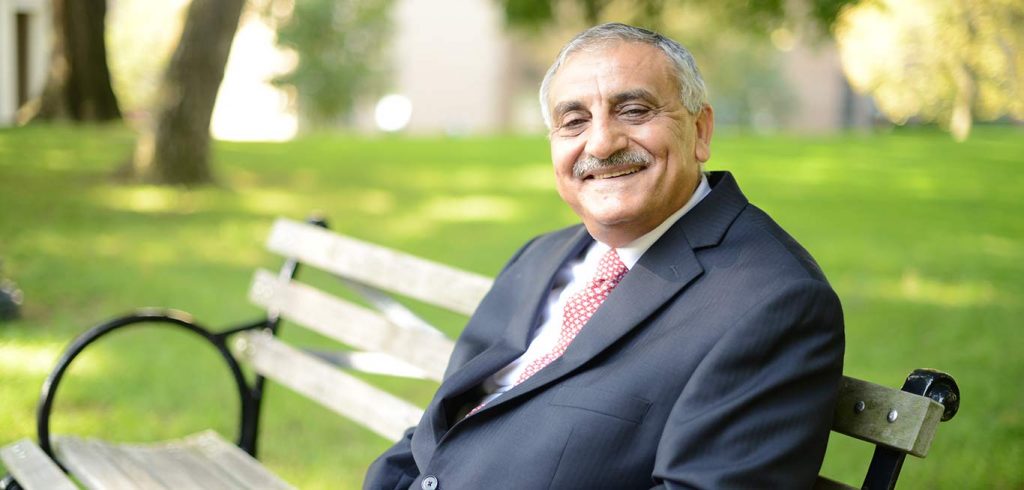To build a city of the future that’s “smarter” and more efficient, it’s not enough to gather mountains of data on the state of its health, transportation, sanitation, education, and security systems. To be of any use, that data needs to be sorted, stored, and analyzed in real time.
Mohammad S. Obaidat, PhD, who this fall joined Fordham’s Department of Computer and Information Science as department chair and professor, is working to make that happen.
Obaidat, a world-renowned cybersecurity expert, recently finalized the book Smart Cities and Homes: Key Enabling Technologies (Elsevier, 2015).
It’s a burgeoning topic, thanks to several emerging trends. Expanding countries like India and China are undergoing unprecedented urbanization, as citizens migrate from the countryside to megacities that are so large they make New York seem quaint. In areas such as transportation and pollution control, information and communication technologies (ICT) will be key to making these cities livable.
Contracting countries such as Japan and Spain, meanwhile, must figure out how to meet the growing medical needs of their aging populations, perhaps through “smart health homes” outfitted with equipment that delivers insulin injections and monitors vitals signs.
Smart Cities shows the many ways ICT can play a role in such metropolises. On security matters, it delves into Obaidat’s own work in pioneering keystroke biometrics, a field that can identify persons by the rhythm of their typing or scrolling style with a mouse. (Mimicking these is much harder than mimicking someone’s voice or stealing his or her password.)
There are potential uses for ICT when it comes to weather too, said Obaidat, who has published 38 books and more than 600 articles in scholarly international journals and as conference proceedings. He is working with the University of Seville to predict fires in the forests in Andalusia, Spain, through computational intelligence, “fuzzy logic” techniques, wireless sensor networks, and computer networks.
“If you could predict forest fires, you’d have the means to prepare for and hopefully avoid them. You could monitor them when they occur and try to put them down as fast as possible, to reduce losses of property and human lives,” he said.
One foreseeable challenge, according to the book, is that the amount of data being generated in today’s digital world is vastly greater than our capacity to understand it, he said.
“If you analyze information in the classical way, it may take days to reach a decision, so we need smart algorithms and technologies that will allow you to take that large volume of traffic data, analyze it, data mine it, search it, compress it, and transport it fast, in order to be able to make timely and accurate decisions,” Obaidat said.
“Worldwide, we still don’t have efficient algorithms to do that.”
There are also goals that are hard to reconcile. The “Internet of Things,” or the array of smart objects wirelessly connected to computer networks, relies on processors with little memory and minimal computing power.
“Because of the object’s limitations, you really cannot have efficient algorithms to protect privacy and security of the data, because an efficient security algorithm requires high computational power with larger memory—a more sophisticated processor,” he said.
Devising algorithms to overcome these limitations is a major part of Obaidat’s plans for the computer and information science department. In addition to the master’s in cyber security and master’s in computer science currently offered, in the fall of 2016 the department will add a master’s in data analytics, which was just approved by the State of New York. Obaidat said a proposal for a doctoral program is under review.
The department is also overhauling the undergraduate curriculum so it meets the standards of the Accreditation Board for Engineering and Technology (ABET). Accreditation is key to employment at many global corporations, and opens doors to many federal and state loans as well as private scholarships, he said.
That global perspective applies to recruitment as well. Obaidat hopes to attract more international students and secure partnerships with universities abroad.
New teaching labs for cybersecurity and data analytics are planned at the Lincoln Center campus. At Rose Hill, a new Wireless Information Networks and Cyber Security (WINCS) research lab will debut in spring 2016.
Despite the real threats of cyberhacking, data theft, and espionage, Obaidat is optimistic about the future of cybersecurity in the United States.
“If you ask me, ‘Can we have a 100 percent secure network,’ the answer is no. The Internet was not designed to carry the traffic it is carrying now. Its protocols are not actually meant to be used with the services that are provided nowadays,” he said.
“We may reach 98, or even 99 percent. But … 100 percent security in all cases, I say no. There will always be challenges and security holes. But if we adopt best practices and implement the most up-to-date cybersecurity protocols and policies, then we can significantly reduce the threat.”

